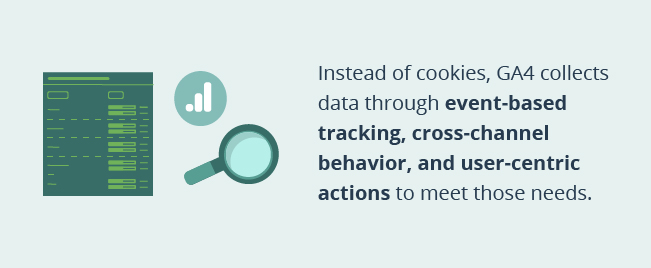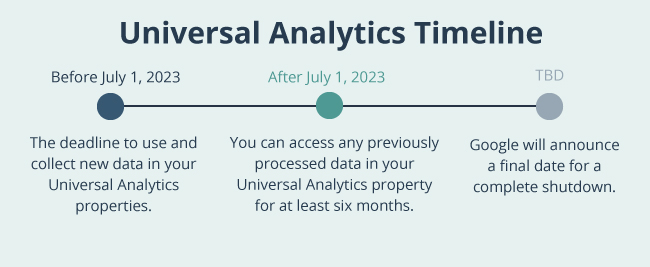The changes announced in 2022 concerning Google Analytics may have roused concern for some digital marketers. Nevertheless, staying innovative by adapting to industry evolutions is essential to what we do, whether we’re preparing for a cookieless future or anticipating shifts made to digital tools.
For example, did you know Google is sunsetting Universal Analytics (UA) next year? While that sounds scary, it simply means that websites using UA need to upgrade to Google Analytics 4 (GA4). If this is news to you, let’s catch you up by exploring what this means along with the pros and cons of Google’s new property.
Why is Google Forcing us to Upgrade to GA4?
Google knows third-party cookies are on their last leg and understands that people—us included—want more privacy. Given that UA is grounded in tracking users through IP addresses and behavioral data from cookies, the next logical step was to design an analytics platform that adheres to privacy protection policies and user needs.
GA4 answers those regulatory and personal shifts by transitioning everyone away from UA ahead of the obsolescence of third-party cookies.
Will Moving to GA4 Make it Harder to Succeed Online?
Marginally. The evolution of data collection and how it relates to privacy protection will inherently produce different results, but moving away from UA is helpful in the long run.
Keep in mind that GA4’s goals are consistent with what came before it—drive sales, app downloads, lead generation, and customer engagement. So, instead of cookies, GA4 collects data through event-based tracking, cross-channel behavior, and user-centric actions to meet those needs.
That makes GA4 a more appealing option for future-proofing a marketing strategy. It offers top-sight of the customer journey by leaning into event-based modeling over invasive data.


When do I Need to Upgrade to GA4?
We recommend updating to GA4 ASAP to avoid future disruptions in your marketing strategy and to give you a head start on growing a database. However, Google offers a helpful timeline covering important dates and how long your data will be accessible we’ve provided below.
Universal Analytics Timeline
- You can use and collect new data in your Universal Analytics properties until July 1, 2023.
- After July 1, 2023, you can access any previously processed data in your Universal Analytics property for at least six months.
- Google will announce a final date for a complete shutdown later.

How Do I Migrate to GA4 from UA?
For starters, we recommend using Google’s Setup Assistant if you’re new to platform migration. It’s also important to know that you can still use a UA account in tandem with GA4 until it goes away entirely. If you’d rather stay exclusive with GA4 once the setup is complete, here’s how it’s done:
- Head to the Admin dashboard and click on the gear icon at the bottom left of the screen.
- Click on GA4 Setup Assistant in the center column and click on “Create New GA4 Property.”
- Click the “Get started” button under the “I want to create a new Google Analytics 4 property” headline.
- Check the “Enable data collection using your existing tags” box to on and click the “Create property” button.
- Follow the prompts to migrate data and essential information from UA to GA4.
We recommend partnering with a digital marketing agency or an individual that understands how to migrate from UA to GA4 properly before making a move. Doing that will secure data and prevent any platform disruptions, etc.
The Pros & Cons of GA4
We know every platform upgrade comes with its own strengths and weaknesses. Therefore, we decided to offer a few of GA4’s pros and cons to acknowledge where it succeeds or fails.
The Pros of GA4:
- Adheres to privacy regulations and customer wants
- Brings in Analytics Intelligence to deliver automated and custom Analytics Insights
- Offers more robust reporting
- Uses machine learning to improves cross-channel marketing, ad placement, and more
- Provides simple integration and more connection with Google Ads
- Allows a better understanding of customer touchpoints
The Cons of GA4
- You’re leaving your comfort zone—new interface means reports and tools are in different locations
- New properties means you’re starting a new database
- The platform is relatively new
- A new set of challenges emerges
- You cannot start accruing historical data until you set up a new GA4 property
- New terminology to learn—e.g., goals are now conversions
Ready to Leverage the Power of GA4?
We moved our clients from UA to GA4 to future-proof their businesses and to ensure we’re maximizing results. Still, we understand the discomfort migrating away from your comfort zone brings—we’ve been there! Remember that moving towards GA4 will ultimately improve your digital strategy in the long run. And keep in mind that we’re here to help if you’re feeling overwhelmed at the thought of migrating your data to another platform.
Want to chat? Contact us with GA4 questions or to simply nerd out over the madness of what Google’s bringing to the table. We are ready when you are.

